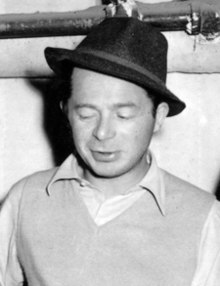
Back Billy Wilder AN بيلي وايلدر Arabic بيلى وايلدر ARZ Billy Wilder AST Billi Vaylder Azerbaijani Білі Уайлдэр Byelorussian Били Уайлдър Bulgarian বিলি ওয়াইল্ডার Bengali/Bangla Billy Wilder Catalan بیڵی وایڵدەر CKB
Billy Wilder | |
|---|---|
 Wilder, c. 1942 | |
| Born | Samuel Wilder June 22, 1906 Sucha, Kingdom of Galicia and Lodomeria, Austria-Hungary |
| Died | March 27, 2002 (aged 95) |
| Occupations |
|
| Years active | 1929–1981 |
| Works | Full list |
| Spouses | |
| Children | 2 |
| Relatives | W. Lee Wilder (brother) Myles Wilder (nephew) Patrick Curtis (nephew) |
| Awards | Full list |
Billy Wilder (/ˈwaɪldər/; German: [ˈvɪldɐ]; born Samuel Wilder; June 22, 1906 – March 27, 2002) was an American filmmaker and screenwriter. He was born in Sucha Beskidzka, Poland, a town in Austria-Hungary at the time of his birth.[1] His career in Hollywood spanned five decades, and he is regarded as one of the most brilliant and versatile filmmakers of Classic Hollywood cinema. He received seven Academy Awards (among 21 nominations), a BAFTA Award, the Cannes Film Festival's Palme d'Or and two Golden Globe Awards.
Wilder became a screenwriter while living in Berlin. The rise of the Nazi Party and antisemitism in Germany saw him move to Paris. He then moved to Hollywood in 1934, and had a major hit when he, Charles Brackett and Walter Reisch wrote the screenplay for the Academy Award-nominated film Ninotchka (1939). Wilder established his directorial reputation and received his first nomination for the Academy Award for Best Director with the film noir Double Indemnity (1944), based on the novel by James M. Cain with a screenplay by Wilder and Raymond Chandler. Wilder won the Best Director and Best Screenplay Academy Awards for The Lost Weekend (1945), which also won the Academy Award for Best Picture.[2]
In the 1950s, Wilder directed and co-wrote a string of critically acclaimed films, including the Hollywood-set drama Sunset Boulevard (1950), for which he won his second screenplay Academy Award; Ace in the Hole (1951), Stalag 17 (1953) and Sabrina (1954).[3] Wilder directed and co-wrote three films in 1957: The Spirit of St. Louis, Love in the Afternoon and Witness for the Prosecution. During this period, Wilder also directed Marilyn Monroe in two films, The Seven Year Itch (1955) and Some Like It Hot (1959).[4] In 1960, Wilder co-wrote, directed and produced the critically acclaimed film The Apartment. It won Wilder Academy Awards for Best Picture, Best Director and Best Original Screenplay.[5] Other notable films Wilder directed include One, Two, Three (1961), Irma la Douce (1963), Kiss Me, Stupid (1964), The Fortune Cookie (1966) and Avanti! (1972).
Wilder received various honors for his distinguished career including the AFI Life Achievement Award in 1986, the Kennedy Center Honors in 1990, the National Medal of Arts in 1993 and the BAFTA Fellowship Award in 1995. He also received the Directors Guild of America's Lifetime Achievement Award, the Laurel Award for Screenwriting Achievement and the Producers Guild of America's Lifetime Achievement Award.[6] Seven of his films are preserved in the United States National Film Registry of the Library of Congress as being "culturally, historically or aesthetically significant".
- ^ Cite error: The named reference
"Polish Town Goes Wild Over Wilder"was invoked but never defined (see the help page). - ^ "1945 | Oscars.org | Academy of Motion Picture Arts and Sciences". www.oscars.org. Retrieved February 10, 2023.
- ^ "Sunset Blvd". Academy Museum of Motion Pictures – Timeline. Retrieved February 10, 2023.
- ^ Cook, David A. (2004). A History of Narrative Film (4th ed.). W. W. Norton & Company. ISBN 0-393-97868-0.
- ^ "The 33rd Academy Awards Memorable Moments | Oscars.org | Academy of Motion Picture Arts and Sciences". www.oscars.org. August 27, 2014. Retrieved February 10, 2023.
- ^ * Hammond, Pete (October 3, 2014). "Steve Martin To Receive AFI Life Achievement Award". Deadline Hollywood. Archived from the original on November 28, 2019. Retrieved November 28, 2019.
- Thorpe, Vanessa (February 17, 2002). "Bafta gives its top honour to Merchant Ivory". The Observer. Archived from the original on November 28, 2019. Retrieved November 28, 2019.
- "Steven Spielberg to Receive Lifetime Achievement Award, DGA's Highest Honor". Directors Guild of America. January 31, 2000. Archived from the original on November 28, 2019. Retrieved November 28, 2019.
- "Directors Guild of America". Archived from the original on November 20, 2010. Retrieved November 2, 2016.
- White, Michael (February 28, 2007). "My Oscar night with Cher". The Guardian. Archived from the original on November 28, 2019. Retrieved November 28, 2019.
- "The Laurel Award for Screenwriting Achievement". Writers Guild of America Awards. Archived from the original on February 23, 2019. Retrieved November 28, 2019.
- "Writers Guild of America, west – Laurel Award Recipients". Archived from the original on December 28, 2012. Retrieved May 26, 2010.
- McNary, Dave (November 19, 2006). "PGA sets Selznick laurel". Variety. Archived from the original on November 28, 2019. Retrieved November 28, 2019.